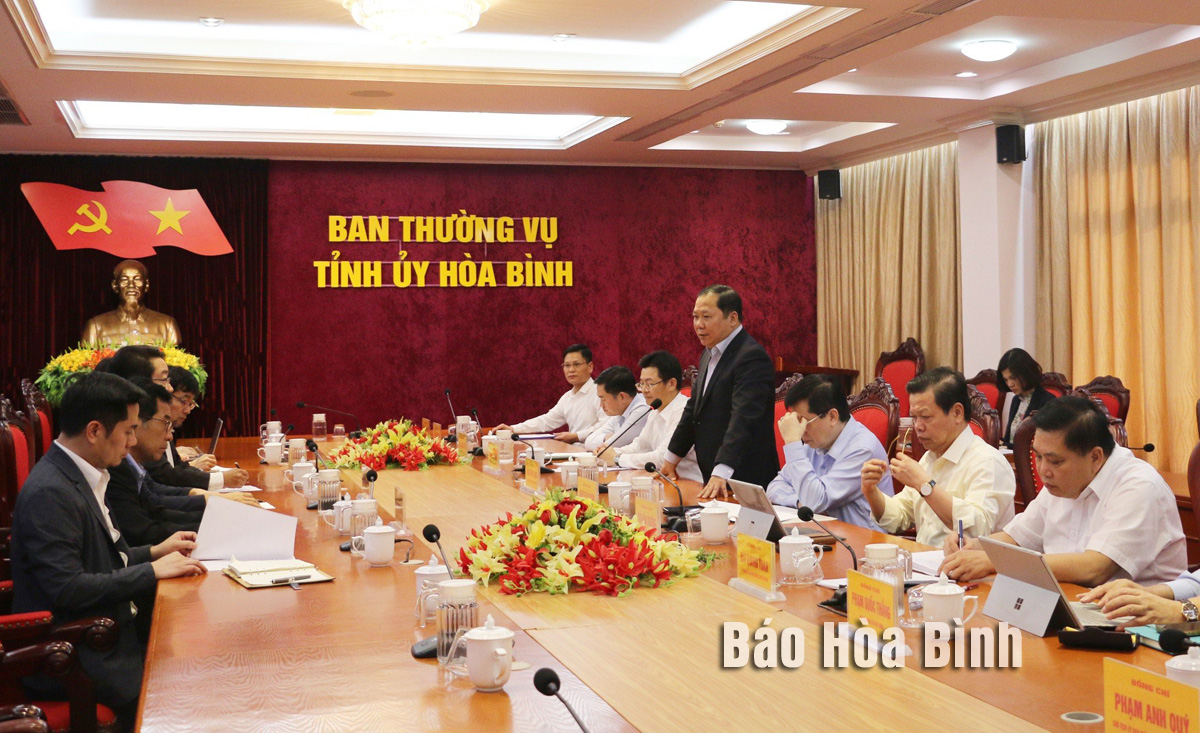
alternate member of the Party Central Committee and Secretary of the Hoa Binh provincial Party Committee Nguyen Phi Long has met with executives from Japan's Meiko Group to discuss its major investment project in the province.

alternate Member of the Party Central Committee and Secretary of Haa Binh Provincial Party Committee Nguyen Phi Long at the meeting.
At
the meeting, Atsushi Sakate, Executive Vice President of Meiko Group, provided
an update on the group’s printed circuit board (PCB) manufacturing facility, a
major development at the Da River Left Bank Industrial Park (IP).
Sakate
said since breaking ground in April 2024, Meiko has accelerated construction,
addressed environmental requirements, and set up wastewater treatment and
employment processes, all in an effort to stay on track with the projected
timeline.
However,
he pointed out several challenges that are slowing progress and requested
provincial support to keep the project on schedule. They included expediting
the Hoa Binh city master plan and detailed zoning for the IP, raising the
allowed building height to five stories, and increasing the land allocated for
wastewater treatment to boost capacity to 10,000 cubic meters per day.
Sakate
also urged provincial authorities to ensure the wastewater treatment facility
is operational by December 2024 to align with Meiko’s production schedule.
Additionally,
he requested an expedited handover of the facility to the designated management
unit and quicker processing of environmental assessments and permits for the
expanded capacity.
In response, Secretary Long directed the provincial working group, led by the
head of the provincial IP Management Board, to collaborate with relevant
departments and Hoa Binh city authorities to address Meiko’s concerns swiftly.
He
emphasised the importance of ensuring an efficient and regulation-compliant
investment process to support the project’s success.
The
Secretary also instructed the Hoa Binh People’s Committee to work with Meiko
Hoa Binh Electronics Co., Ltd., and infrastructure investor Da Hop to advance
planning for the city area and the IP.
Under the guidance of the Party Committee, the provincial People’s Committee
will collaborate with key departments to facilitate the handover of the
wastewater treatment facility to Da Hop, further supporting infrastructure
development and project sustainability in Hoa Binh.
Since the beginning of this year, under the direction of the Department of Agriculture and Environment, the Sub-Department of Agricultural, Forestry, and Fishery Product Quality Management has strengthened the integration of the professional activities to promote and guide the organizations and individuals in the production and trading of agricultural, forestry, and fishery products to comply with the legal regulations regarding the use of chemicals, pesticides and veterinary medicines in crop cultivation, livestock farming and aquaculture. They also provide guidance to processing and manufacturing establishments on keeping the records to trace the product origins and using food additives from the approved list according to the regulations.
Hoa Binh province saw a significant rise in state budget revenue in the first two months of 2025, heard a meeting chaired by Vice Chairman of the provincial People’s Committee Quach Tat Liem.
Ha Thi Ha Chi, a 26-year-old graduate in law, has taken an unconventional path by returning to her hometown in Mai Chau district to establish the Tong Dau Cooperative, creating stable jobs for local women and bringing Thai ethnic brocade weaving to the global market.
As the Lunar New Year 2025 approached, pork prices surged, creating a profitable season for farmers in Tan Vinh commune, Luong Son district. Taking advantage of the rising demand, Can Minh Son, a farmer from Coi hamlet, sold over 30 pigs at 69,000 VND/kg, each weighing more than 100 kg. After deducting expenses, his family earned a profit of over 50 million VND.
alternate member of the Central Party Committee, Secretary of the Hoa Binh provincial Party Committee Nguyen Phi Long on March 5 had a working session with Yan Jiehe, Founder and Chairman of the China Pacific Construction Group, one of China's largest private corporations in the field of transport infrastructure. Deputy Secretary of the provincial Party Committee, Chairman of the provincial People's Committee Bui Duc Hinh and leaders of provincial departments and sectors also attended the working session.
The electronic printed circuit board (PCB) manufacturing and processing plant of Japan’s Meiko Group, located at Da River Left Bank Industrial Park in Hoa Binh city with a total investment of over 200 million USD, is expected to create thousands of jobs and make a significant contribution to the local budget.



